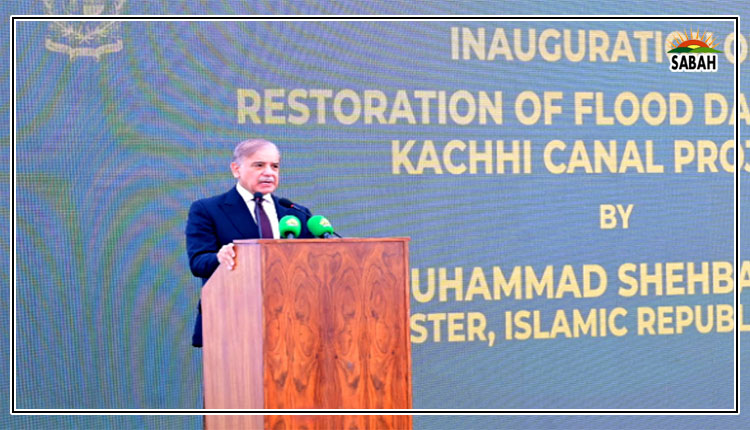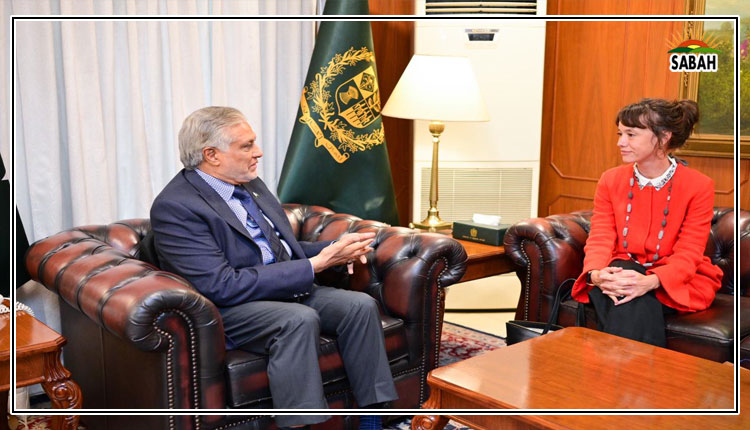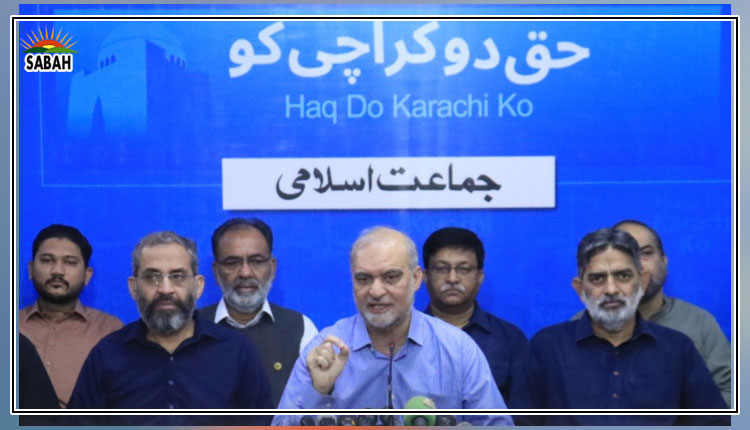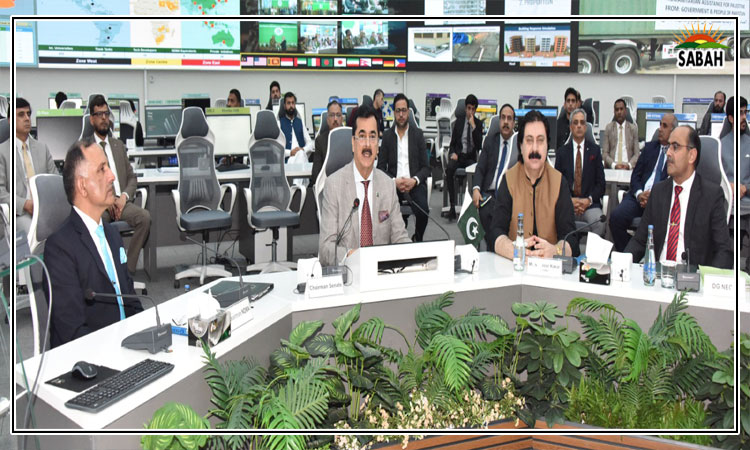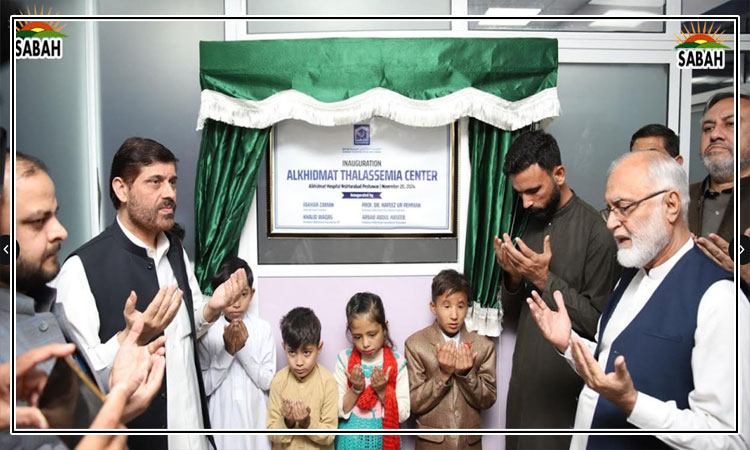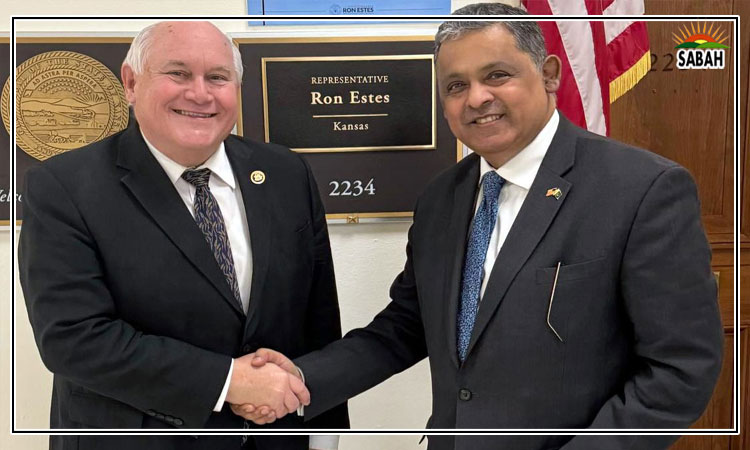Apex court declares military trials of civilians arrested in the wake of violent protests in the country on May 9 to be null & void
ISLAMABAD, Oct 23 (SABAH): A five-member larger bench of the Supreme Court of Pakistan on Monday declared the military trials of civilians arrested in the wake of violent protests in the country on May 9 to be null and void.
The court announced its verdict in the case a few hours after it was reserved. Justice Ijazul Ahsan had headed the bench comprising Justices Munib Akhtar, Yayha Afridi, Sayyed Mazahar Ali Akbar Naqvi and Ayesha A. Malik.
In a 4-1 majority ruling, the court said that the trial of May 9 suspects would be conducted in ordinary courts. Justice Afridi had disagreed with the majority verdict.
The court, in a short order released later in the day, declared Section 2(1)(d) of the Army Act, which elaborates on persons subject to the Act, to be in violation of the Constitution and “of no legal effect”. The court also declared Section 59(4) (civil offences) of the Act to be unconstitutional.
Section 2(1)(d) of the Pakistan Army Act states: “persons not otherwise subject to this Act who are accused of seducing or attempting to seduce any person subject to this Act from his duty or allegiance to government, or having committed, in relation to any work of defence, arsenal, naval, military or air force establishment or station, ship or aircraft or otherwise in relation to the naval, military or air force affairs of Pakistan” can be tried under the secrets act.
Section 59(4) states: “Notwithstanding anything contained in this Act or in any other law for the time being in force a person who becomes subject to this Act by reason of his being accused of an offence mentioned in clause (d) of subsection (1) of section 2 shall be liable to be tried or otherwise dealt with under this Act for such offence as if the offence were an offence against this Act and were committed at a time when such person was subject to this Act ; and the provisions of this section shall have effect accordingly.”
The order said the trials of 103 civilians and accused persons, identified by the government in a list provided to the SC, and all other persons who may be placed under trial in connection with the events of May 9 should be held in criminal courts.
“It is further declared that any action or proceedings under the Army Act in respect of the aforesaid persons or any other persons so similarly placed (including but not limited to trial by court martial) are and would be of no legal effect,” the court added.
At the outset of Monday’s hearing, Attorney General for Pakistan (AGP) Barrister Mansoor Usman Awan came to the rostrum and said that he would present arguments on why a constitutional amendment was not required in the case at hand.
“A trial in military courts fulfills all the requirements of criminal courts,” he said. He said that the military trials of civilians had formally commenced. He said that the verdicts issued by the military courts would also detail the reasoning.
The AGP said that a matter concerning an attack on a restricted area or building could also go to military courts.
At one point, Justice Ahsan asked, “A constitutional amendment was required to try terrorists but not for civilians? I am trying to understand your argument.”
AGP Awan said that if the accused had a “direct link” to the armed forces, then a constitutional amendment was not required. He said that the suspects would be tried under Section 2(1)(d)(ii) of the Army Act.
He then noted that the court had raised a question about the framing of charges against the suspects. “All the requirements of a criminal case will be met in the trial under the Army Act,” he said.
He further said that the trial of May 9 suspects would be similar to how it is conducted in criminal courts. “The reasoning will be given in the verdict and the evidence will be recorded,” Awan said.
He said all the requirements for fair trial under Article 10-A (right to fair trial) of the Constitution would be fulfilled. He said that appeals against the verdict could also be filed in the high courts and subsequently the apex court.
During the hearing, Justice Ahsan asked about those who had been tried by military courts in the past. “Were the accused in 2015 civilians, foreigners or terrorists?” he asked.
The AGP replied that the suspects included both nationals and foreigners. He said that those tried in 2015 also included those who facilitated terrorists.
Justice Ayesha also asked the AGP how he would connect his arguments with Article 8(3) of the Constitution. “According to the law, a link to the armed forces in necessary [for trial in military courts],” she said.
Justice Ahsan remarked that the Constitution protected the fundamental rights of citizens.
Petitioner Aitzaz Ahsan’s lawyer Salman Akram Raja told the bench that trials of civilians already commenced before the top court’s verdict in the matter.
Responding to this, Justice Ahsan said the method of conducting proceedings of the case would be settled after Attorney General of Pakistan (AGP) Mansoor Usman Awan completed his arguments.
Presenting his arguments, the AGP said he would explain to the court why a constitutional amendment was necessary to form military courts in 2015 to try the terrorists.
Responding to Justice Ahsan’s query, AGP Awan said the accused who were tried in military courts were local as well as foreign nationals.
He said the accused would be tried under Section 2 (1) (D) of the Official Secrets Act and a trial under the Army Act would fulfill all the requirements of a criminal case.
“The trial of the May 9 accused will be held in line with the procedure of a criminal court,” the AGP said.
The AGP said the 21st Amendment was passed because the terrorists did not fall in the ambit of the Army Act.
“Amendment was necessary for the trial of terrorists [then] why amendment not required for the civilians? At the time of the 21st constitutional amendment, did the accused attack the army or installations?” inquired Justice Ahsan.
AGP Awan replied that the 21st Amendment included a provision to try accused involved in attacking restricted areas.
“How do civilians come under the ambit of the Army Act?” Justice Ahsan asked the AGP.
Justice Malik asked AGP Awan to explain what Article 8 of the Constitution says. “According to Article 8, legislation against fundamental rights cannot be sustained,” the AGP responded.
Justice Malik observed that the Army Act was enacted to establish discipline in the forces. “How can the law of discipline in the armed forces be applied to civilians?” she inquired.
The AGP responded by saying that discipline of the forces is an internal matter while obstructing armed forces from discharging duties is a separate issue.
He said any person facing the charges under the Army Act can be tried in military courts.
“The laws you [AGP] are referring to are related to army discipline,” Justice Ahsan said.
Justice Malik inquired whether the provision of fundamental rights be left to the will of Parliament.
“The Constitution ensures the provision of fundamental rights at all costs,” she added.
If the court opened this door then even a traffic signal violator will be deprived of his fundamental rights, Justice Malik said.
The AGP told the bench that court-martial is not an established court under Article 175 of the Constitution.
At this, Justice Ahsan said court martials are not under Article 175 but are courts established under the Constitution and Law.
After hearing the arguments, the bench reserved the verdict on the petitions.
Meanwhile speaking to the media after the verdict was announced, Barrister Chaudhry Aitzaz Ahsan — who was one of the petitioners in the case — termed the verdict “very important”, adding that it would also strengthen democracy, Constitution and the justice system“.
He said that all institutions must now realise that the SC had declared that no one was above the law. “We were against military courts and we endeavoured against it. The verdict has shown that giving relief is the prerogative of the SC,” he said.
Aitzaz Ahsan said that reports had alleged that trials had begun even though the government had stated that this would not happen until the apex court was informed.
“The government informed the SC but after the commencement of trial. The government was supposed to inform before trials [began],” he said.
He said civilian institutions would gain confidence after the verdict and strive to improve their performance. He thanked the apex court for listening to the petitioners in the case and giving them a chance to speak.
He said that judges should be impartial and should not fear repercussions from their judgments. “In military courts, the judges are not independent. There is a colonel and he knows he can be transferred or expelled from the army,” he said.
He said that the Supreme Court’s verdict declaring the military trial of civilians as null and void will strengthen the Constitution, democracy, and legal system.
Sharing his opinion on the matter, Ahsan said the apex court judgment will have lasting effects. “An important case and an important verdict,” he said, and added that today was a “historic day”.
He noted that it would strengthen the country’s democratic system and its foundations.
Ahsan was of the view that it means that the “Constitution reigns supreme”. SC has also rejected the government’s plea to interpret the law and allow the trial of civilians under army laws, he added.
“A king is a king because the law makes him a king,” he said and added that the ruling means the “law is above you”.
The hearing of the case was put off indefinitely in August with ex-CJP Bandial saying that the court did not want to see Pakistan Army pointing their guns at civilians, since they were meant to defend the country and its people.
The observations had come when Attorney General for Pakistan (AGP) Mansoor Usman Awan emphasised that soldiers were equipped with sophisticated weapons and were trained to shoot, but they had exercised restraint on May 9.
Former CJP Jawwad S. Khawaja, senior counsel Aitzaz Ahsan, Karamat Ali, Zaman Khan Vardag, Junaid Razzaq, the Supreme Court Bar Association, PTI Chief Imran Khan, Hafeezullah Khan Niazi, Lt-Col Inamul Rahiem, Naeemuddin Qureshi etc have filed the petitions before the apex court.
Human rights groups and several politicians have criticised the trials of civilians in military courts, warning that they will undermine civilian supremacy.
After the Oct 11 upholding of the Supreme Court (Practice and Procedure) Act 2023, it is now a legal requirement that all cases moved under Article 184(3) involving interpretation of the Constitution should be heard by a bench consisting of not less than five SC judges.
And under Section 5 of the law, any decision by the five-judge bench could be challenged and any appeal in this regard could be filed within 30 days from the court order which will have to be fixed within a period not exceeding 14 days.
During earlier hearings, the SC had turned down the government request to constitute the full court consisting of all available judges.
Recently an application had been filed by Junaid Razzaq with a request to fix the military courts’ case as early as possible since he had been informed that the trial by military courts of civilians had commenced in violation of SC directions not to commence the trial before seeking prior permission from the apex court.
The applicant pleaded before the court that early hearing of the matter will be in the interest of justice, otherwise if the trial of his son — Azam Junaid — commenced and concluded in haste, the petitioner would suffer irreparable loss.


